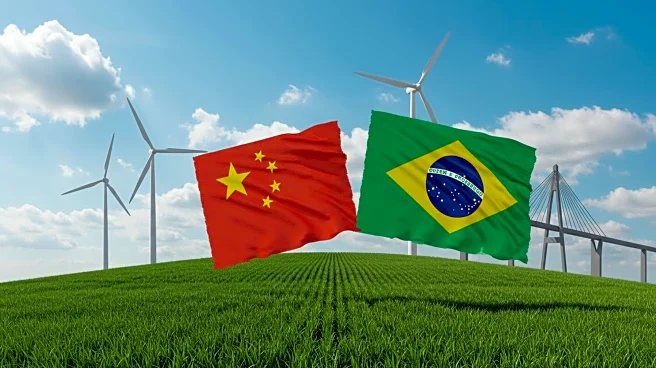What's Happening?
The strategic partnership between China and Brazil is evolving into a significant global economic alignment, focusing on agriculture, energy, and infrastructure. This collaboration is reshaping trade dynamics and presenting investors with opportunities in cross-border supply chain integration and emerging market exposure. Brazil's agricultural exports, such as soybeans and corn, are crucial to China's food security, with joint ventures like Longping Agriculture Development Co., Ltd. enhancing productivity. In energy, China absorbs a substantial portion of Brazil's oil exports, while Chinese firms are investing in renewable projects like the TN wind power project. Infrastructure collaboration includes investments in power transmission lines and digital infrastructure, with companies like Lenovo expanding their presence in Brazil.
Why It's Important?
The China-Brazil partnership is significant for global trade and investment, offering a stable environment for long-term investments by reducing currency risks through RMB-BRL trade settlements. This partnership enhances Brazil's role in global trade networks, especially as it prepares for its 2025 BRICS presidency. Investors stand to gain from opportunities in agricultural technology, renewable energy projects, and smart infrastructure development. The collaboration prioritizes sustainability, technological innovation, and financial sovereignty, aligning with global economic trends and providing a win-win scenario for investors.
What's Next?
As Brazil assumes the BRICS presidency in 2025, it is expected to drive multilateral reforms, further strengthening its position in global trade networks. Investors may continue to explore opportunities in sectors like agricultural tech, renewable energy, and digital infrastructure. The ongoing development of projects like the Gas Natural Açu (GNA) and the expansion of Chinese tech firms in Brazil indicate continued growth and integration in these sectors.
Beyond the Headlines
The partnership between China and Brazil could lead to long-term shifts in global economic power dynamics, with both nations bypassing the U.S. dollar in trade settlements. This move may influence other emerging markets to adopt similar strategies, potentially altering the traditional financial systems and reducing geopolitical risks associated with currency fluctuations.










